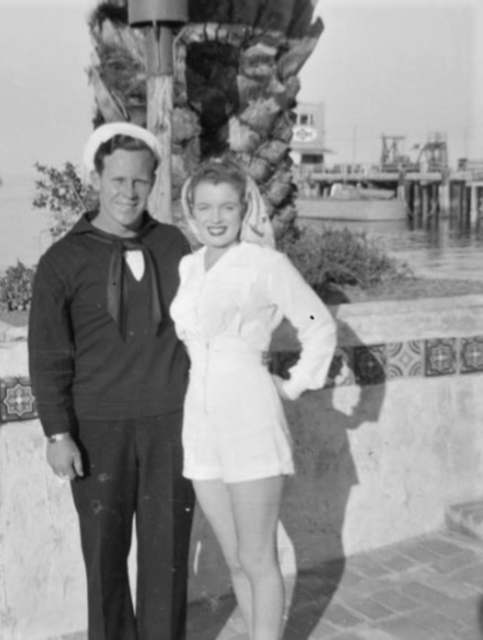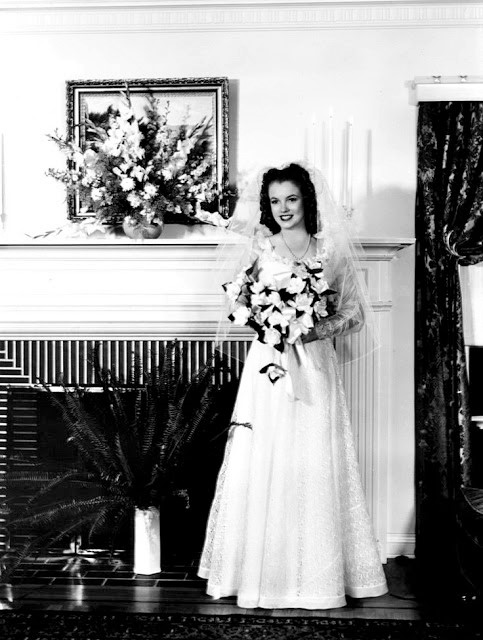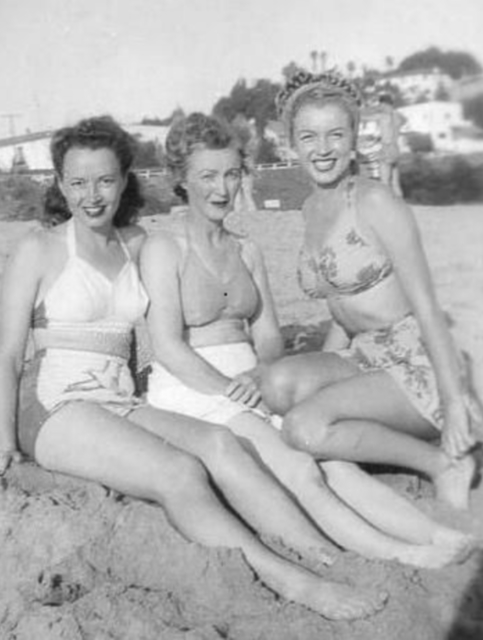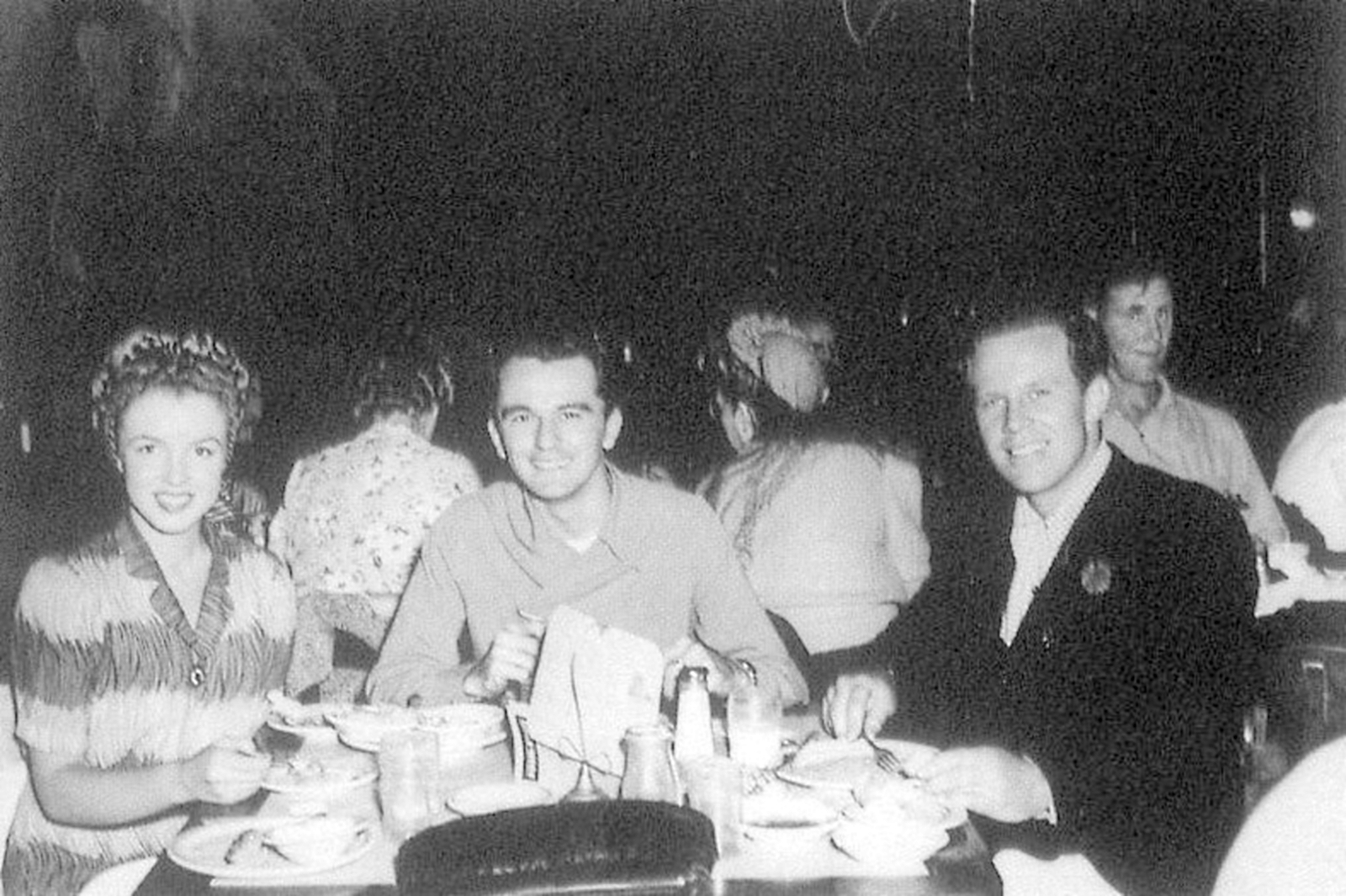Mrs. James Dougherty
1941 Thru 1944
Norma Jeane Dougherty Child Bride
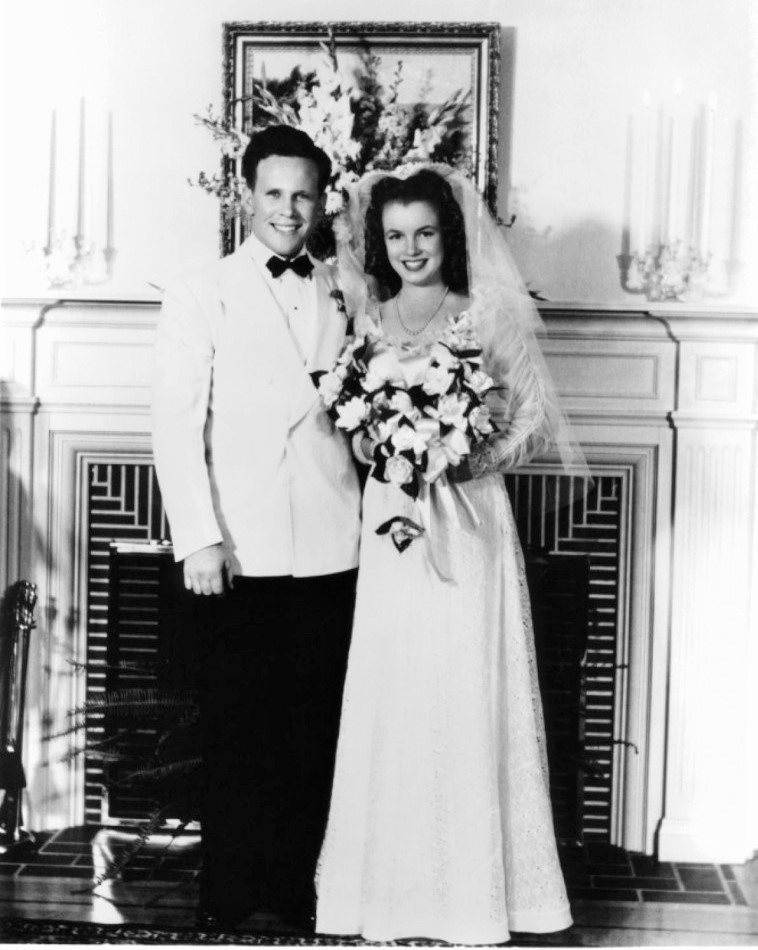
Her final year at Emerson Junior High did not produce any memorable grades, except in journalism. A fre-quent contributor to the school newspaper, she provided an article on her study, by questionnaire, to determine the qualities, according to boys, that created the perfect woman, the dream girl. Remarkably, with what appears to be a foreshadowing of her future movie career, fifty three percent of gentlemen prefer blondes, replies to her questionnaires indicated. Perhaps Grace was clairvoyant after all and Norma was destined to become a movie star. And yet, her poor performance in Rhetoric and the Spoken Arts belied any belief that she was suited for an acting career. In spite of her growing popularity and her obvious ability to attract others into her sphere, she still suffered from a fundamental insecurity, one aggravated by her fear of public speaking. This fear manifest itself in a speech impediment, a mild stammer that she struggled with for the remainder of her life and never completely overcame: it often reappeared when she became stressed or nervous.
But even at the age of fifteen, she displayed an uncanny faculty that would serve her well throughout her life: manipulating an otherwise negative situation into a relative positive one. Already known as the Mmmm Girl for her developing beauty, she equated that cognomen with her tendency to stammer and cleverly became the M-m-m-m girl. As if to foreshadow the alias she would assume in five short years, the thirteenth letter of the alphabet signified her final nickname as a school girl. Graduation from the ninth grade came for the M-m-m-m Girl in June of 1941.
September brought the tenth grade at Van Nuys High School and the first school term brought a crush on her handsome, twenty year old neighbor, Jimmie Dougherty. Nine months away from her sixteenth birthday, major life changes awaited the young but developing Norma Jeane. Just the opposite of her first boyfriend, Jimmie was a responsible young man who had also experienced a difficult childhood. The youngest of five children, Jimmie and his family suffered considerably during the depression; he did all he could to help by taking odd jobs like picking fruit or working in a deli. He even worked briefly at a mortuary to help support his parents and siblings. What began as a favor for Grace, driving Norma and Bebe home from school, developed into a friendship with Norma. Jimmie wrote in his memoir:
And so the routine began of my driving those two young girls home from school every day, and it didn’t get past me that Norma Jeane never let Bebe sit in the middle of the seat. Norma Jeane took that place every day, right from the very start, and it was impossible for me to not notice she was pressing close to me … And I did happen to notice that Norma Jeane was very beautiful. Luminous sort of. Glowing kind of. And then Pearl Harbor turned the country upside down and inside out (Dougherty 13-15).
They began to date formally, despite their five year age difference, after Jimmie escorted Norma Jeane to a Christmas dance staged by Adel Precision Products, Doc Goddard’s employer, just weeks after the Japanese attacked Pearl Harbor. Aided and abetted by Ethel, Jimmie’s mother, Grace manipulated the couple into a relationship that continued through the end of 1941 and with the start of 1942, became a chaste romance. Norma thought Jimmie was a dreamboat and to him, the five year age difference no longer mattered. Jimmie recalled:
The dance was wonderful. I was surprised and not unhappy to discover that I was having a marvelous time with this kid, Norma Jeane Mortensen. That night there was no way I couldn’t notice that she’d lean in very close to me during the slow numbers. I mean very close. She was no kid when she did that … Grace and Doc, sitting on the sidelines watching us dance, noticed I’d gone way past doing the neighborly thing and that I was, it was plain for everyone to see, having the time of my life (Dougherty 15).
While the start of 1942 brought romance into Norma Jeane’s life, it also brought an announcement that Doc had been transferred to West Virginia by Adel. Thus the Goddards prepared to move to the East; but due to their poor financial situation, Norma had to remain in California. This sudden announcement surely frightened Norma, reminded her of all the vicissitudes previously endured, bad memories aggravated no doubt by the impending loss of her friend Bebe. But Grace had a plan: she was working on something wonderful, she promised Norma (Spoto 72). She suggested to Ethel that Jimmie should marry his young girlfriend, lest she be forced back into the life of an orphan. As the Goddards finalized their moving plans, Norma returned to the household of Aunt Ana, whose health had improved enough to accept the distraught waif. No doubt at this point, Norma considered herself an unwanted and dispensable thing. It soon became apparent, though, as Aunt Ana’s health issues returned, Norma’s residency with the ailing woman could not be maintained. In March, then, Jimmie’s mother unceremoniously proposed that he wed the fifteen-year-old once she became the legal age of sixteen on June the 1st. If not, Ethel explained to her son, Norma would go back into an orphanage until the age of eighteen. Hesitant initially, James admitted:
I could feel myself being had―but surprised that I really didn’t mind. Not at all. I was actually sort of feeling good about this very sudden, very weird idea … My heart and my head told me I just could not possibly let Norma Jeane go back to the orphanage if I could save her from that. I felt obligated. Someone had to step in and rescue this beautiful, sweet girl, this young maiden. Someone like one of those knights in shining armor I’d read about as a kid. A knight sort of like, well … me. What else could I do? I said yes. After all, it was the only decent thing a gentleman could do, under the circumstances (Dougherty 20).
Jimmie reasoned that once he joined the military and left for the service, Norma Jeane could move in with his family where she would have a stable home. He was simply being a Good Samaritan. Wedding preparations quickly made, on June the 19th, just weeks past the tender age of sixteen, Norma entered into an arranged marriage with James Edward Dougherty, a twenty-one year old neighbor that she had dated for about ten months and who simply agreed to marry her, was motivated at best by Christian charity or chivalry and at worst, by pity. Neither of them were prepared for the rigors and demands of marriage; but more importantly, Jimmie, was particularly ill-equipped to handle a soul as fragile, a soul as vulnerable, a soul as sensitive and a person as fundamentally insecure as the new Mrs. James Dougherty.
Of course, conflicting stories about the quality of Norma’s relationship with Jimmie exist. In the two memoirs that he wrote about his marriage to the future movie star, Marilyn Monroe, Jimmie paints a significantly different, happier and grander picture than the one painted later in life by Marilyn. In My Story, Marilyn paints a dreary picture of a convenience marriage: Actually our marriage was a sort of friendship with sexual privileges (Monroe 29). Yet, one thing is for certain: during the time they lived on Catalina Island when Jimmie became an active Merchant Marine, Norma Jeane began to display herself in revealing bathing suits and clothes, not as a way of seduction, her then jealous husband would later admit, but because she was proud of her body and was not ashamed to partially reveal it. Norma Jeane realized very well that she had a beautiful body and knew men liked it, Jimmie recalled. She took Muggsy for walks wearing a tight white blouse and tight white shorts, with a ribbon in her hair for a touch of color. It was just like a dream walking down the street (Spoto 84).
Norma Jeane and Jimmie attended a dance in the Catalina Casino ballroom in late 1943, one thrown for all the servicemen stationed on the island, and Norma was by far the most popular dancing partner that evening. Relegated to a role of cast-aside observer, Jimmie also overheard the many admiring comments about the beauty and physical charms of his young bride. Exasperated and jealous, he announced to Norma, although the dance was just beginning, that they were leaving. She complied but announced, during the ride home with Jimmie, that she might return to the dance alone. Jimmie told her if she did, she need not bother coming home, a threat from a man losing influence over and control of his wife and one that worked with the insecure Norma Jeane. There are indications, however, that what began as an act motivated by charity had become more for Jimmie; and he had, in fact, fallen deeply in love with his child bride while she was beginning to perceive certain aspects of herself that needed expression. One might conclude, then, for Norma Jeane, the process of estrangement and divorce had already begun, a process requiring but one significant event to complete.
In the Spring of 1944, Jimmie was shipped to the Pacific and despite the deficiencies she might have perceived in her husband and despite any unspoken desires she might have harbored, with his impending departure, her feelings of insecurity, her fear of abandonment returned full force and she pleaded with her husband not to leave her alone, an entreaty that he could not fulfill. With Jimmie gone, she moved in with her in-laws. Ethel, who was working as a nurse for Radioplane Munitions at the time, quickly and easily arranged a job for her daughter-in-law and Norma Jeane became a highly regarded employee.
During Norma’s first two years of marriage, marital problems developed between Grace and Doc Goddard. Eventually, they separated and by mid-1944, Grace was living and working in Chicago while Doc and Bebe remained in West Virginia. Grace and her estranged husband had already visited with Berniece and family in Detroit, so with the arrival of autumn in 1944, Norma Jeane decided it was time for her to do the same. By rail, she traveled cross-country to Detroit where Berniece and her husband, Paris, their daughter, Mona Rae, and Paris’ sister, Niobi, waited to greet her. From Berniece’s memoir:
I remember waiting at the train station in Detroit for Marilyn to appear that first time. Of course, then she was still Norma Jeane. We had been writing to each other over the years and had exchanged pictures, but we had never met face to face. She’d told me she’d be wearing a cobalt blue suit and a hat with a heart shaped brim, but I worried that I wouldn’t recognize her when she stepped off the train. There was no missing her! She stood out immediately from all the rest of the passengers, so tall and pretty and fresh (Miracle 3).
Although many letters had passed between them during the preceding six years, the meeting that took place during the autumn of 1944 was a watershed event for both young women. Berniece expressed its importance:
We drove around showing her some of Detroit … Some of the time all four of us were talking at once, and some of the time nobody was saying a word. Instead of sitting back to relax in the car, Norma Jeane and I sort of perched in the edge of the seat at an angle so we could stare at each other. Every now and then our arms would fly around each other in a hug and we’d look in each other’s eyes and say how happy we were. We didn’t have anything very original or profound to say. We were both so excited we were almost out of our minds; we were hardly aware of what was going on. The two of us were just … we sat there like two people who had just fallen in love, I guess. We were overwhelmed at finally getting to see each other. I was so proud of her (Miracle 38).
Late in October, Norma learned that Jimmie had received an unexpected leave and he was sailing home and she had to be there to meet him. Before she returned to California, she visited Doc and Bebe in West Virginia and then Grace in Chicago. Once home, she briefly returned to being Mrs. Dougherty before her husband, again, returned to sea duty. After his departure, she settled into her normal routine of work at Radioplane Munitions. As 1944 careened into 1945, it’s doubtful that Mrs. Dougherty considered for one small moment the life altering event approaching her.
